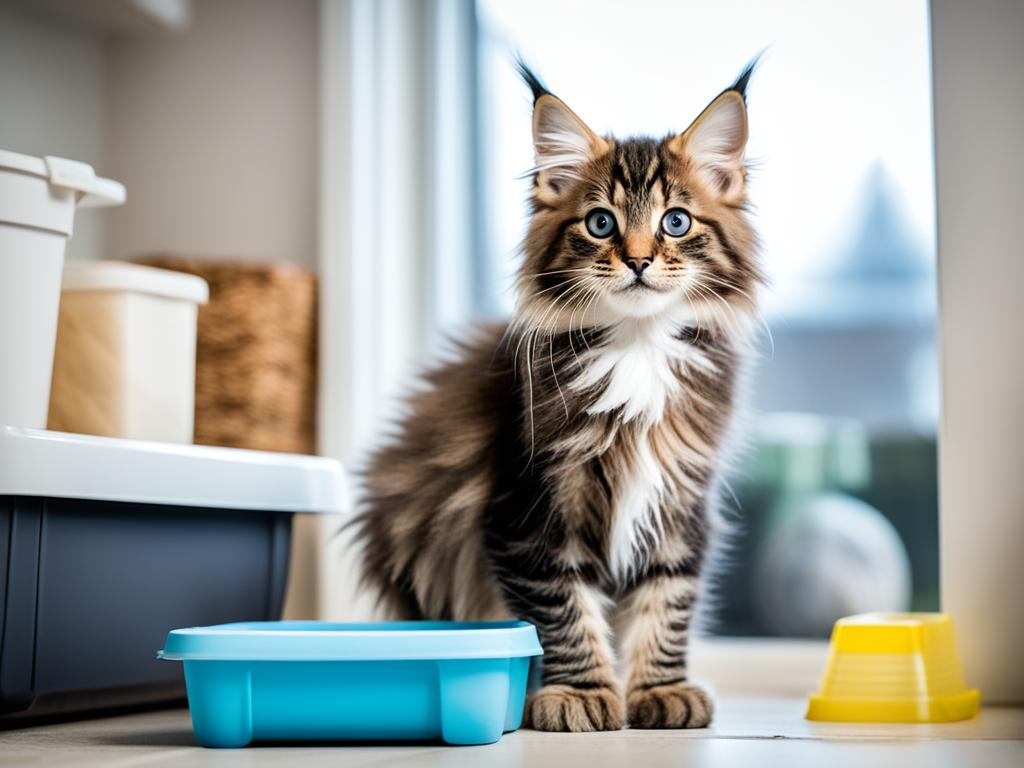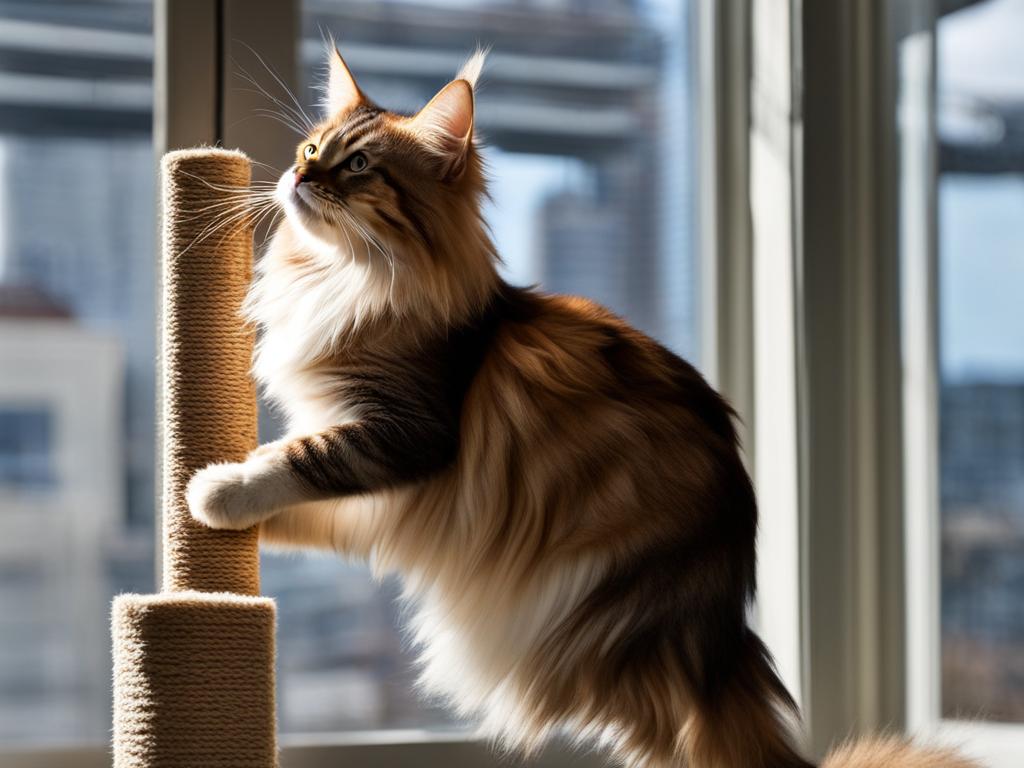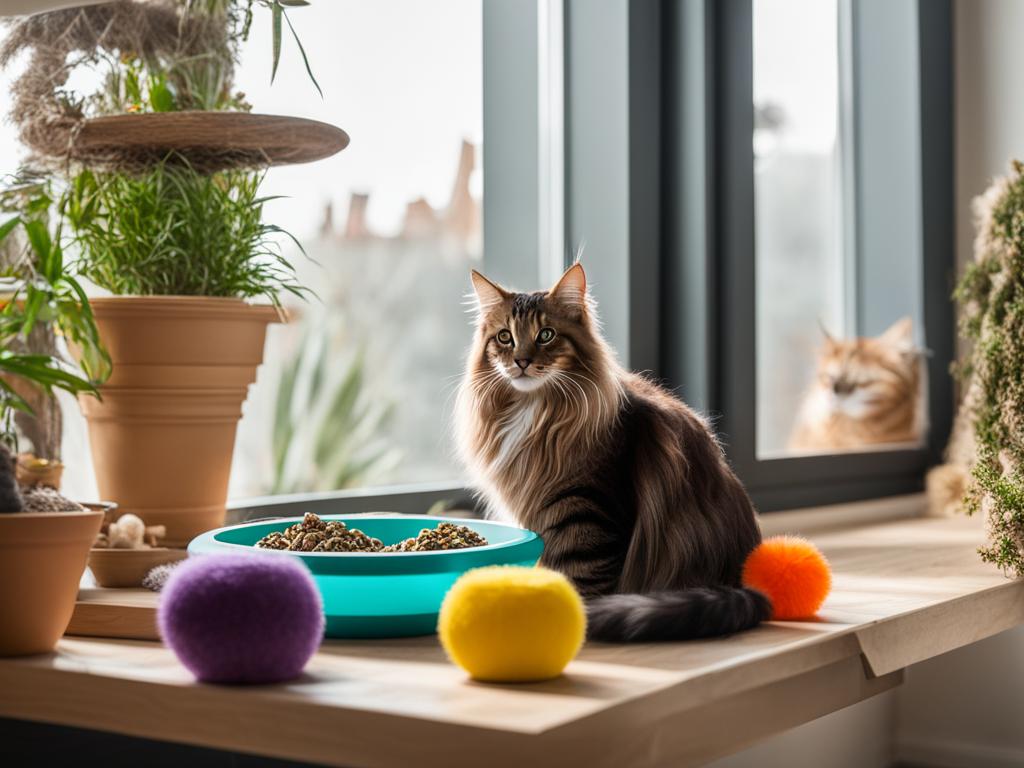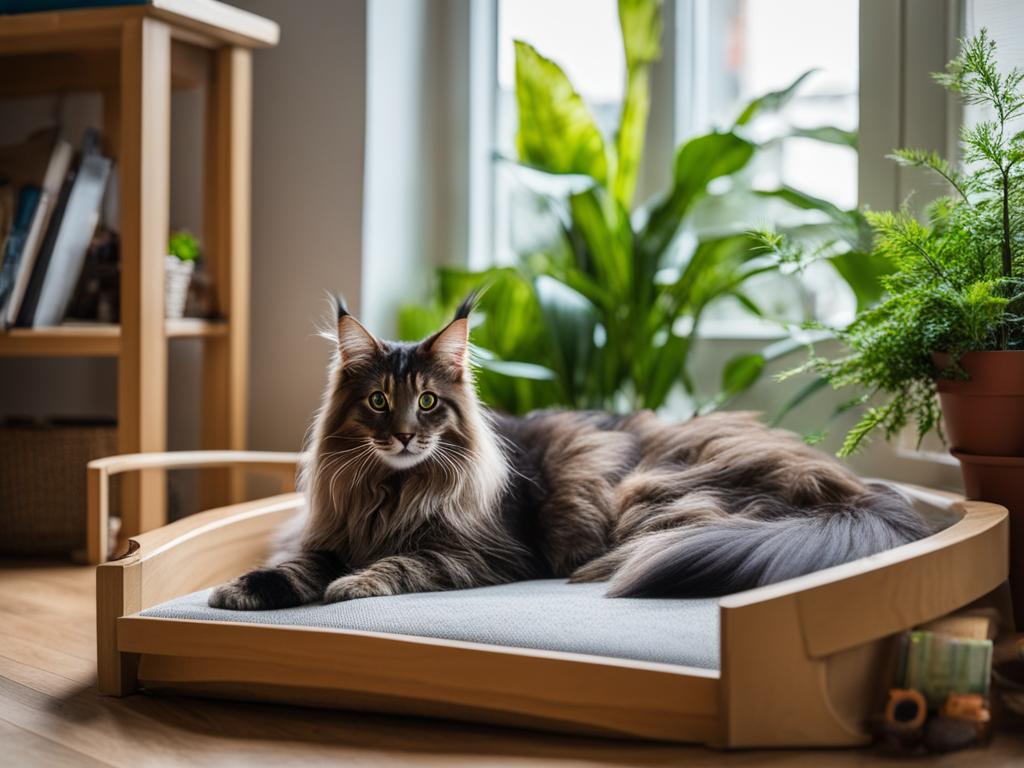Maine Coons, with their large size and distinctive appearance, are a popular breed known for their origins in Maine, USA. These cats have long, thick fur that requires regular grooming. While Maine Coons can adapt well to indoor living, they still possess a natural curiosity and need for stimulation. In this guide, we will explore essential tips for grooming, litter box training, and indoor activities to keep your Maine Coon cat happy and healthy indoors.
Key Takeaways:
- Regular grooming is crucial for maintaining the health of a Maine Coon’s dense coat.
- Litter box training is essential to ensure proper hygiene for indoor Maine Coon cats.
- Maine Coons require mental and physical stimulation through engaging indoor activities.
- Feeding routines should be carefully managed to support a Maine Coon’s energy needs.
- Routine veterinary care and preventive measures are important for the overall health of Maine Coons.
Grooming Tips for Maine Coon Cats
Maine Coon cats are known for their dense coats, which require regular grooming to keep them in good condition. Proper grooming not only enhances the appearance of your Maine Coon but also prevents matting and promotes overall skin and coat health. Here are some grooming tips to keep your Maine Coon looking their best:
- Brushing: Daily brushing with a soft brush helps remove loose hair, debris, and tangles from your Maine Coon’s coat. It also minimizes shedding and reduces the chances of hairballs. Start brushing from the head, working your way down to the tail, and be gentle to avoid any discomfort. Consider using a grooming glove or a wide-toothed comb for added effectiveness.
- Bathing: While Maine Coons are generally self-grooming, monthly baths can help keep their coat clean and fresh. Use a cat-friendly shampoo and lukewarm water. Begin by wetting your Maine Coon’s coat thoroughly, then apply the shampoo and gently massage it into the fur. Rinse well to remove all traces of shampoo and ensure no residue is left behind.
- Nail Trimming: Regular nail trimming is essential for the health and well-being of your Maine Coon. Long nails can cause discomfort, pain, and potential injury. Use a cat-specific nail trimmer and carefully trim the tips of the nails. Take care not to cut too close to the quick, which is the pink area within the nail that contains blood vessels. If you are unsure or uncomfortable with trimming your Maine Coon’s nails, consider seeking assistance from a veterinarian or a professional groomer.
By following these grooming tips, you can ensure that your Maine Coon’s coat remains tangle-free, clean, and healthy. Remember to approach grooming sessions with patience, reward your cat with treats or praise, and make it a positive and bonding experience for both of you.
Litter Box Training for Maine Coons
Litter box training is an essential aspect of indoor cat care, especially for Maine Coon cats. These magnificent felines, known for their large size and distinctive appearance, can adapt well to living indoors. Proper litter box training ensures a clean and stress-free environment for both you and your Maine Coon.
When it comes to litter box training, having the right setup is crucial. Maine Coons require a spacious litter box with low sides to comfortably accommodate their size. This allows them to enter and exit the litter box without any difficulties. Consider investing in a larger litter box specifically designed for larger cat breeds, ensuring ample space for them to move around comfortably.
The placement of the litter box is equally important. Choose a quiet and easily accessible area in your home where your Maine Coon can find the litter box without any confusion or obstacles. Avoid placing the litter box in high-traffic areas or near loud appliances that might startle or disturb your cat while using the litter box.
To begin the training process, show your Maine Coon cat where the litter box is located. Gently place them in the litter box a few times to familiarize them with its presence. Encourage them to explore and use the litter box by praising them when they successfully use it. Positive reinforcement is key to reinforcing the desired behavior and making them feel comfortable in their litter box.
Consistency is crucial during the litter box training process. Ensure the litter box is kept clean and fresh by regularly scooping out waste and replacing the litter as needed. Maine Coons are meticulous animals, and a dirty litter box may discourage them from using it. Regular cleaning also helps maintain proper hygiene and prevents any unpleasant odors.
Remember, accidents can happen during the training process. If your Maine Coon has an accident outside the litter box, avoid scolding or punishing them. Instead, calmly clean up the mess and continue with the training process. Punishment can create negative associations and potentially lead to future litter box aversion.
With patience, consistency, and positive reinforcement, your Maine Coon will quickly grasp the concept of using the litter box. In no time, they will become proficient in using their designated area for elimination, ensuring a clean and hygienic indoor environment for both of you.

| Tips for Successful Litter Box Training |
|---|
| 1. Choose the right litter box: Provide a spacious litter box with low sides to accommodate your Maine Coon’s size. |
| 2. Consider the location: Place the litter box in a quiet and easily accessible area of your home. |
| 3. Show them the litter box: Gently place your Maine Coon in the litter box to familiarize them with its presence. |
| 4. Positive reinforcement: Praise your cat when they successfully use the litter box to encourage desired behavior. |
| 5. Keep it clean: Regularly clean the litter box to ensure freshness and prevent aversion. |
Indoor Activities for Maine Coon Cats
Maine Coons are an active and intelligent breed that requires mental and physical stimulation to prevent boredom. Keeping them engaged with a variety of indoor activities is essential for their well-being. Here are some indoor activities to keep your Maine Coon happy and entertained:
- Interactive Toys: Provide your Maine Coon with a selection of interactive toys to keep them mentally stimulated. Toys that require problem-solving, such as puzzle toys, can engage their natural hunting instincts and keep them entertained for hours.
- Scratching Posts: Maine Coons love to scratch, so having a sturdy scratching post is essential. This will not only keep them entertained but also help maintain their claws and prevent them from scratching your furniture.
- Climbing Structures: Maine Coons are natural climbers, so having tall cat trees or climbing structures in your home can provide them with an outlet for their climbing instincts. This will also give them a vantage point to observe their surroundings and satisfy their curiosity.
- Treat-Dispensing Toys: Treat-dispensing toys can provide mental stimulation for your Maine Coon. Fill them with their favorite treats or dry kibble, encouraging them to work for their food and keeping them entertained.
- Playtime: Engage in regular play sessions with your Maine Coon using toys that allow them to chase and pounce. Feather toys, laser pointers, and interactive fishing rods are great options to keep them active and stimulated.
By creating a stimulating and enriching environment for your Maine Coon, you can prevent boredom and ensure they lead a happy and fulfilled indoor life.

Image: Indoor activities are essential for Maine Coon cats to prevent boredom.
Feeding Routine for Maine Coon Cats
Maine Coons, known for their hearty appetite, require a consistent feeding routine to meet their energy needs and maintain a healthy weight. It’s important to choose a high-quality cat food that is specifically formulated for Maine Coons and matches their age and activity level. To prevent obesity, monitor their weight regularly and adjust their portions accordingly.
Always provide fresh water for your Maine Coon, ensuring it is easily accessible. Consider using interactive feeders or food puzzles to make mealtime more engaging and mentally stimulating. This not only slows down their eating but also prevents overeating and promotes a healthy feeding routine.
In consultation with your veterinarian, you can obtain specific dietary recommendations for your Maine Coon based on their individual needs and any underlying health conditions. Your vet can provide guidance on portion sizes, feeding frequency, and the appropriate balance of nutrients to keep your Maine Coon in optimal health.
To summarize, a well-planned feeding routine, including high-quality cat food, fresh water, and interactive feeding methods, will ensure your Maine Coon receives the nutrition they need while preventing obesity and maintaining a healthy lifestyle.

Benefits of a Balanced Diet
- Provides essential nutrients for growth and development
- Supports a healthy immune system
- Promotes healthy skin and coat
- Prevents nutritional deficiencies
- Aids in maintaining a healthy weight
Tips for Feeding Your Maine Coon
- Follow a consistent feeding schedule, ideally twice a day
- Measure the appropriate portion sizes to prevent overfeeding
- Avoid feeding table scraps and human food, as this can lead to digestive issues and obesity
- Monitor their weight and adjust portions as needed
- Provide a variety of flavors and textures to keep mealtime interesting
Health Care for Maine Coon Cats
Maine Coons are generally a healthy breed, but proactive health care is essential to ensure their well-being. Regular veterinary check-ups are crucial in detecting any potential health issues early on. Vaccinations and preventive treatments for parasites are also important aspects of their health care regimen.
Maine Coons can be predisposed to certain health conditions, such as hypertrophic cardiomyopathy and polycystic kidney disease. It is essential to monitor their health closely and seek prompt veterinary attention if any concerning symptoms arise. Your veterinarian can guide you on specific preventive measures and provide appropriate treatments if necessary.
In addition to regular health care, it is important to create a stress-free environment for your Maine Coon. Stress can have a negative impact on their overall well-being and can even lead to behavior problems. Providing outlets for their natural behaviors, such as scratching posts and interactive toys, can help prevent boredom and promote healthy behaviors.
FAQ
How often should I groom my Maine Coon cat?
It is recommended to brush your Maine Coon cat’s fur daily to prevent matting and hairballs. Monthly baths are also beneficial to keep their coat clean and fresh.
How do I litter box train my Maine Coon cat?
To litter box train your Maine Coon cat, provide a large litter box with low sides in a quiet and accessible area. Show them the location of the litter box and encourage them to use it. Regularly clean the litter box to maintain its freshness.
What are some indoor activities for Maine Coon cats?
To keep your Maine Coon cat entertained indoors, provide interactive toys, scratching posts, climbing structures, and puzzle toys. Engage in regular playtime using toys that encourage their natural chasing and pouncing instincts.
What should I include in the feeding routine for my Maine Coon cat?
It is important to feed your Maine Coon cat a balanced diet that is appropriate for their age and activity level. Monitor their weight and adjust their portions accordingly. Provide fresh water at all times and consider using interactive feeders or food puzzles for mental stimulation during mealtime.
How can I ensure the health care of my Maine Coon cat?
Ensure the health care of your Maine Coon cat by scheduling regular check-ups, vaccinations, and preventive treatments for parasites. Monitor their health for any signs of conditions that Maine Coons may be prone to, such as hypertrophic cardiomyopathy and polycystic kidney disease. Maintain a stress-free environment and provide outlets for their natural behaviors to prevent behavior problems.

Leave a Reply